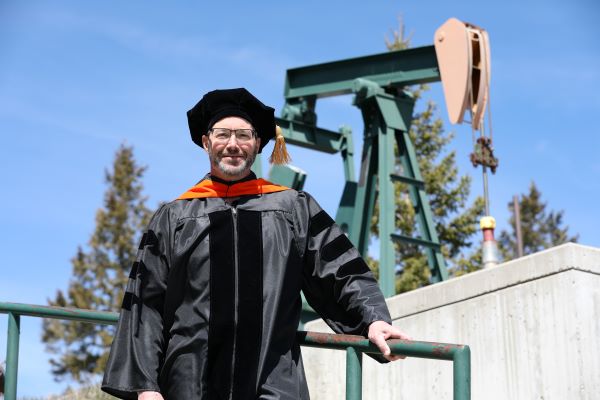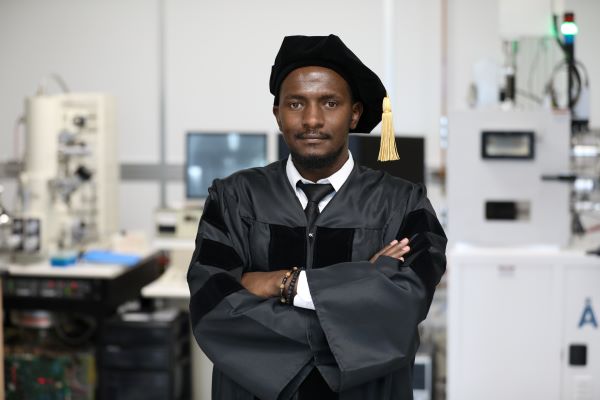First class of Earth Science and Engineering Ph.D. students to graduate Saturday
Montana Technological University will present degrees to the first graduates of its Doctor of Philosophy (Ph.D.) in Earth Science and Engineering program at commencement on Saturday, May 4, 2024. They include a longtime assistant professor determined to cross the finish line to meet a personal goal, an international student from Kenya who overcame homelessness and has long-term ambitions to become a politician and make a difference in his home country, and another international student who traveled from Iran in the throes of a global pandemic to study carbon capture and sequestration with goals to research and develop solutions to global climate change.
“This is an exciting time, not only for our three new graduates, but for Montana Tech,” said Chancellor Les Cook. “The Ph.D. in Earth Science and Engineering is our second doctoral degree and was approved shortly after I became chancellor. I’m thrilled for our graduates and the university. We’ve enjoyed having them and look forward to their incredibly right futures.”
The Montana Board of Regents approved the Earth Science and Engineering Ph.D. program in March 2020. It is the first doctoral program the university has offered on its own. Its Materials Science Ph.D. program is in its 10th year, and is run in collaboration with Montana State University. Much of the work to create the program was spearheaded by Associate Professor of Environmental Chemistry Alysia Cox and Professor Emeritus Beverly Karplus Hartline.
“Rarely does an academic administrator get to watch the first graduating class of a Ph.D. program,” Vice Chancellor for Research and Dean of the Graduate School Angela Lueking said. “I am honored to witness this transformative moment, and I'd like to thank Bev Hartline and Alysia Cox for all their work in putting together and managing this program, respectively.”
David Reichhardt

Assistant Professor David Reichhardt will be the first graduate of the Earth Science and Engineering Program. Reichhardt earned a master’s degree in geophysics from Montana Tech in 1996. He has been employed by the University’s Petroleum Engineering Department since 2007, and teaches classes on petroleum reservoir modeling.
“We are so excited to have our first Earth Science and Engineering Ph.D. student, David Reichhardt, graduating this spring,” Petroleum Engineering Department Head Dr. Todd Hoffman said. “It has been my great pleasure to work with David on his Ph.D. I could say ‘be his advisor,’ but that really doesn’t make sense in this case. David and I have been faculty in the Petroleum Engineering Department together for over 10 years, and we have become good friends. It was less like advising and more like a close collaboration. His research on tight oil reservoirs is fantastic, and I was happy to be part of his journey. I am really proud of what he accomplished.”
Reichhardt said he always wanted to earn his doctorate. Two of his three children already have their Ph.D.
“It’s been something I’ve wanted to do for years,” Reichhardt said. “Part of the reason I had never pursued it was that the opportunity wasn’t there. I had a family. I had work. This made it possible. There was some flexibility to work with any of the Earth Science and Engineering-themed programs at Montana Tech.”
Reichhardt appreciates Dr. Alysia Cox's work in helping create the program.
“It was a huge deal,” Reichhardt said. “If she hadn’t done that I probably never would have gotten my doctorate. I appreciate the time and effort of making it possible.”
Reichhardt’s thesis is titled, “Variable Scale Pore System Effects on Unconventional Reservoir Fluid Properties and Production Mechanisms.”
“It’s a reservoir modeling study,” Reichhardt said. “I am studying how fluid is moving through these rocks. How are we extracting fluid out of there?”
Reichhardt said the deep dive into the topic has spurred him to further explore.
“There’s still a lot more to learn and there’s still a lot I don’t know,” Reichhardt said. “It’s opened up a lot of future research opportunities for working with graduate students in the future. There are a lot of questions that need to be answered.”
Amos Taiswa

Amos Taiswa, of Kilgoris, Kenya will finish his doctoral program this summer, concluding an incredible academic journey where he rose above great personal challenges to rise to the top of his field.
"Amos has an amazing story of how he ended up at Montana Tech,” Mechanical Engineering Department Head Dr. Jack Skinner said. “We have been incredibly fortunate to have him as a student. His passion for providing clean water to people across the globe, along with his engineering and science background have meshed well with our nanotechnology expertise. The solutions he has created through his research will make valuable impacts on society. I'm thankful for all he has done and look forward to his future impacts as a leader."
Taiswa began his undergraduate studies at Embry Riddle Aeronautical University in Florida. After one semester, Taiswa found himself homeless, spending nights in the library. Taiswa persevered, and emailed the cross country coach at MSU Northern in Havre, seeking a change of pace. Taiswa graduated with a 3.98 GPA in civil engineering, earned Academic All-Conference honors twice, and was awarded the 2017 Champion of Character Award for Men's Cross Country.
His academic journey was beginning, however. Taiswa earned his M.S. in Environmental Engineering from Montana Tech in 2021. He has worked as a graduate research assistant in the Montana Tech Nanotechnology Laboratory since 2020.
In the lab, Taiswa uses a bioinspired method called electrospinning to create samples that mimic those of spiderwebs. His goal is to create materials that can be used for water purification.
Taiswa’s successes in the lab came in conjunction with personal challenges.
“Any Ph.D. journey is inherently demanding, and for me, finding a balance between academic rigor and personal well-being proved challenging,” Taiswa said. “It's all too easy to veer towards overwork or into feelings of despair when research and coursework aren’t going your way. Remembering where I have come from and learning to stay resilient worked well for me and my church community has helped me in that aspect.”
Taiswa also lost one of his biggest supporters on his journey.
“At the start I had unwavering support from my father, whose passing during my second semester cast doubt and some disbelief,” Taiswa said. “I persevered, believing that he would have taken immense pride in witnessing this achievement. This accomplishment is dedicated to him.”
Overall, Taiswa says he is pleased with the knowledge he gained at Montana Tech.
“Beyond the specialized knowledge I got, my Ph.D. experience came with a network of industry experts, investors, innovators, managers and academic collaborators,” Taiswa said. “This network serves as a conduit for future collaborations and real-world problem-solving endeavors. Education, far from books, publications and performing experiments, can help to address complex challenges and to effect meaningful change.”
He would recommend the program to others.
“I wholeheartedly recommend the ESE program to aspiring scholars,” Taiswa said. “You can traverse disciplinary boundaries and gain knowledge that might be unique and a combination of non-traditional fields. Core classes in the program involve various departments. You can nurture your unique specialty unlike traditional programs where core courses are fixed.”
Taiswa’s long-term goal is to return to Kenya and become a political leader. His short-term goals focus more on science.
“In recent semesters, my focus has included engagement with the NSF Innovation Corps, where I have had the opportunity to participate in the development and commercialization of promising technologies in the form of start-up,” Taiswa said. “Several of these innovations are currently undergoing patenting processes here at Tech. Looking ahead, I am eager to put some more time into commercializing these technologies, utilizing networks built over the years here. I am optimistic about the transformative potential of our endeavors and want to commit more to driving innovation and progress in real-world solutions.”
Amirhosein Riahi

Amirhosein Riahi’s journey to Montana Tech began on January 12, 2021, during the COVID-19 pandemic. Riahi had earned a B.S. in Mining & Mineral Processing Engineering in 2017 and an M.S. in Mining & Environmental Engineering in 2020 from the University of Tehran.
“Montana Tech aligned well with my background, and I had heard good things about the university in the fields of mining engineering and geology,” Riahi said. “Through a complicated process, I came to the U.S. after almost a year.”
The process involved traveling first to the United Arab Emirates for about twenty days, then to Turkey for another twenty days, and finally a 46-hour journey to Butte, Montana. At last, he made it.
Riahi initially pursued the Earth Science and Engineering Ph.D. program in the Geological Engineering Department, and then secured a position in Dr. Richard LaDouceur’s Char Laboratory within the Mechanical Engineering Department. During his Ph.D. studies in the Char Lab, he developed a new methodology to improve the rate at which carbon dioxide is adsorbed onto carbon-based materials, utilizing low-frequency, high-amplitude (LFHA) resonant vibrations. This method enhances the transportation of carbon dioxide molecules, thereby accelerating the overall adsorption kinetics. The findings of his research offer an innovative strategy for post-combustion carbon capture and sequestration (CCS) technologies, promising more efficient ways to sustain carbon neutrality and combat climate change.
“It has been a bit of a whirlwind since I met Amir,” LaDouceur said. “He asked me to be his advisor for the Earth Science and Engineering Ph.D. program, and luckily I had a project that suited him related to carbon capture and sequestration. It has fortunately turned out to be an easy decision because Amir has worked very hard to get up to speed on the project and move through qualification and candidacy in the ESE program very quickly. His work has taken second place in a graduate student poster contest and forthcoming publications in high impact journals.”
LaDouceur is no stranger to new Ph.D. programs. He was in the first cohort of the Materials Science Ph.D. program at Montana Tech.
“I think it helped me advise Amir going through this new Earth Science and Engineering Ph.D. program,” LaDouceur said.
While at Montana Tech, Riahi joined the school’s rock band, hiked, and snowmobiled in the Pioneer Mountains. He participated in career fairs, a multitude of international conferences and Techxpo, all in an effort to not only become a top-notch scientist, but also to become a well-rounded community member.
“Just dedicating oneself to studying in isolation and achieving top scores is insufficient," said Riahi. "Being a successful student includes more than academic excellence alone. Individuals who only focus on studying alone, neglecting interaction with peers and professors, may find themselves lacking in overall success and happiness in their lives. Cultivating a diverse presence within academia is crucial for achieving fulfillment and success. This does not devalue education; instead, it underscores the importance of maintaining a balanced and engaged approach to learning, while also emphasizing the need to keep one's spirit up."
Riahi could only travel back to visit family and friends in Iran twice during his time at Montana Tech due to visa restrictions. It was difficult to be so far away, especially when the people important to him were facing challenging times.
Still, Riahi persevered.
“As a Ph.D. student, there is a need to coordinate numerous side projects and collaborations involving individuals from various departments within and, at times, outside the university, to a point where you become a project manager. Other examples of the types of responsibilities that a Ph.D. student might be going through are learning theoretical and practical aspects of different lab instruments, as well as communicating with companies and their technical support teams. Doing all these tasks in addition to your own project is sometimes frustrating, but ultimately, you learn many things that pave the way for you as a future professional.”
Riahi is passionate about climate change and hopes to use his knowledge to use in order to help build a better future for the world.
“My priority will be finding startups and people who are passionate about carbon sequestration to mitigate climate change, because by 2050, based on the Paris Agreement, that’s a must for the future of our planet,” Riahi said.